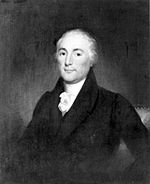James Sheafe
| James Sheafe | |
|---|---|
 |
|
|
United States Senator from New Hampshire |
|
|
In office March 4, 1801 – June 14, 1802 |
|
| Preceded by | John Langdon |
| Succeeded by | William Plumer |
| Member of the U.S. House of Representatives from New Hampshire's At-large district (Seat 1) | |
|
In office March 4, 1799 – March 3, 1801 |
|
| Preceded by | Peleg Sprague |
| Succeeded by | George B. Upham |
| Member of the New Hampshire Senate | |
|
In office 1791 1793 1799 |
|
| Member of the New Hampshire House of Representatives | |
|
In office 1788–1790 |
|
| Personal details | |
| Born |
November 16, 1755 Portsmouth, Province of New Hampshire |
| Died | December 5, 1829 (aged 74) Portsmouth, New Hampshire |
| Political party | Federalist |
| Residence | Portsmouth |
| Alma mater | Harvard University |
James Sheafe (November 16, 1755 – December 5, 1829) was a United States Representative and Senator from New Hampshire. Born in Portsmouth, he completed preparatory studies and graduated from Harvard College in 1774. He engaged in mercantile pursuits, was a member of the New Hampshire House of Representatives from 1788 to 1790, a member of the New Hampshire Senate in 1791, 1793 and 1799, and a member of the state Executive Council in 1799.
Sheafe was elected as a Federalist to the Sixth Congress (March 4, 1799 – March 3, 1801); he was then elected to the U.S. Senate and served from March 4, 1801, until his resignation on June 14, 1802. He was an unsuccessful candidate for Governor of New Hampshire in 1816 and died in Portsmouth; interment was in St. John's Church Cemetery.
In 1815, Sheafe was elected a member of the American Antiquarian Society.
...
Wikipedia
